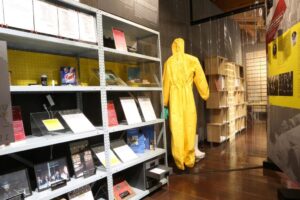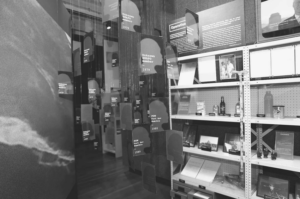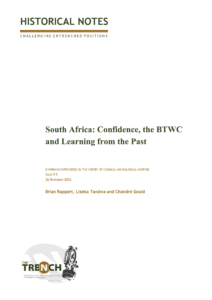Verification and Transparency: Learning from Project Coast
Introduction to Historical Notes, Issue #5
The fifth issue of the Historical Notes series was prepared by Professor Brian Rappert, Ms Lizeka Tandwa and Dr Chandré Gould.
The South African Defence Force (SADF) established a top-secret chemical and biological weapon (CBW) programme code-named ‘Project Coast’ that operated between 1981 and 1995. Its primary aims were to develop a defensive capability for the SADF and weaponise chemical agents for crowd control, specifically during protests, and for the targeted assassinations of political activists in and outside of South Africa. The history and motives of this CBW programme, as far as it can be understood, have been covered in several publications.
While the CBW programme in South Africa can be considered to have been small in scale compared to other biological weapons (BW) programmes and the full technical capabilities of the BW elements of the programme remain unclear, this programme had significant potential and impact in the pre-democratic South Africa. The activities of Project Coast, for example, included the development of delivery mechanisms for anthrax, cholera and cyanide and organophosphates to assassinate enemies of South Africa. There were also failed efforts to develop an anti-fertility vaccine, intended for black women, as a means of population control.

The South African CBW programme today, while subject to multiple investigations and revelations nationally and internationally remains insufficiently understood by many in South Africa and abroad. It is still unclear how many people in and around South Africa were affected and impacted by its CBW activities. The victims remain unknown and forgotten. The nature and extent of the programme remain unclear. The many unknowns about Project Coast and the associated impunity continues to evoke apathy and ‘fear of the unknown,’ which impede the process of using the lessons that can be drawn from the South African CBW programme to ensure that BW programmes like Project Coast do not occur again in the future.
Transparency and truth-telling are widely assumed to be necessary to enable and foster state accountability. They have also been accepted as a requisite for reconciliation, confidence and trust. The extent to which truth serves as a catalyst for any of these aims, however, needs careful consideration. This chapter evaluates the role of truth, using the case of South Africa’s former chemical and biological weapons (CBW) programme. Our central contention is that while transparency and truth-telling are important in interpreting the past, informing the present, as well as envisioning the future, assumptions that a positive correlation exists between truth-reconciliation, as well as transparency-confidence, entail oversimplifications. This is because fostering confidence can be independent of truth-telling and transparency, as exemplified by the case of South Africa’s former CBW programme.
This Historical Note discusses how transparency and truth-telling have figured in securing confidence nationally and internationally. Our assessment is that fact-sharing, truth-telling and transparency about the apartheid-era chemical and biological warfare programme were not the key ingredients leading to confidence regarding South Africa’s commitment to the Biological and Toxins Weapons Convention (BTWC). To illuminate this position, we evaluate the roles of truth in (1) the Truth and Reconciliation Commission (TRC) of South Africa, and (2) South Africa’s transparency (or lack thereof) in the BTWC. The authors begin by briefly describing the activities of South Africa’s CBW programme and the questions that linger about it. This serves as an entry to unpacking the roles of truth and confidence, both welcomed and unwelcomed roles.

In terms of the underpinning methodology, the analysis revisits a study conducted by two of the authors, Brian Rappert and Chandré Gould, on the place of transparency, confidence-building measures and confidence in South Africa as well as the BTWC. That study drew on dozens of one-to-one interviews as well as focus groups with civil servants, professional organisations, non-governmental organisations (NGOs) and others. A recurring theme of those discussions was the acceptability of a lack of transparency. The elaboration of the justifications for limits to transparency given below is used to reconsider how confidence is formed and maintained.
Brian Rappert, Lizeka Tandwa and Chandré Gould, South Africa: Confidence, the BTWC and Learning from the Past, Historical Notes, no. 5. (The Trench, 26 November 2022), 20p. [PDF]
On the working paper series
 The Historical Notes working paper series contains passages from an ongoing, wide-ranging research project into the history of chemical and biological warfare whose story starts out with the question of when our ancestors began manipulating poison. The research project focusses less on the discussion of individual incidents than on identifying and characterising social, cultural, political and scientific trends that helped to shape narratives of chemical and biological weapon use through human and civilisational evolution. It also aims to critically review our present-day (re-)construction and understanding of past events.
The Historical Notes working paper series contains passages from an ongoing, wide-ranging research project into the history of chemical and biological warfare whose story starts out with the question of when our ancestors began manipulating poison. The research project focusses less on the discussion of individual incidents than on identifying and characterising social, cultural, political and scientific trends that helped to shape narratives of chemical and biological weapon use through human and civilisational evolution. It also aims to critically review our present-day (re-)construction and understanding of past events.
Being research in progress, the working papers do not necessarily reflect future conclusions. As part of the overall effort, new sources of information may be found. Or work on other parts of the project may lead to new insights or uncover trends and linkages between historical trends. As a result, certain sections may require revision.
From this perspective, questions, comments or criticism on the historical notes are welcome and encouraged.
